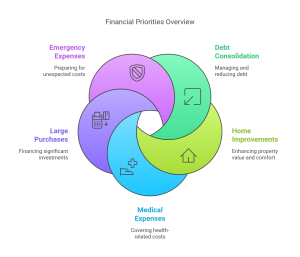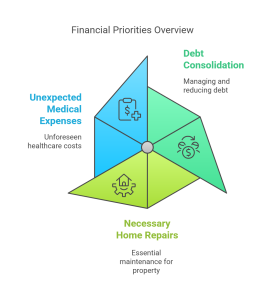Are you facing a significant expense and wondering if a personal loan is the answer?
Life can present unexpected financial challenges. Whether it’s a home repair, medical emergency, or consolidating high-interest debt, finding the right way to finance your expenses is crucial. One option many consider is a personal loan, but is it the right choice for you?
A personal loan can be a powerful financial tool when used wisely. However, it’s essential to understand the pros and cons and how to ensure it aligns with your financial goals before deciding. This guide will walk you through everything you need about personal loans—from their benefits and risks to how they can be used effectively. By the end of this post, you’ll have a clearer picture of whether a personal loan is the right solution for your financial needs.
Understanding Personal Loans
What is a Personal Loan?
A personal loan is a lump sum of money borrowed from a bank, credit union, or online lender that you repay over time with interest. These loans are typically unsecured, meaning they don’t require collateral like a car or house. However, some lenders offer secured personal loans, which require an asset as security.
Personal loans come with either:
- Fixed interest rates – The interest rate remains unchanged throughout the loan term, ensuring predictable monthly payments.
- Variable interest rates – The rate fluctuates based on market conditions, meaning your payments could increase or decrease.
Common Uses for Personal Loans
People take out personal loans for various reasons, including:
- Debt consolidation – Combining multiple high-interest debts into one manageable loan with a lower interest rate.
- Home improvements – Financing renovations or repairs that increase property value.
- Medical expenses – Covering unexpected or hefty medical bills.
- Large purchases – Buying appliances, electronics, or other big-ticket items.
- Emergency expenses – Handling unexpected financial challenges without depleting savings.

The Importance of Credit Score
Your credit score plays a vital role in loan eligibility and interest rates. A high credit score (typically 700 and above) can help you secure lower rates, while a low credit score may lead to higher interest rates or loan denial. Improving your credit score before applying for a loan could save you significant money if your credit score is poor.
When is a Personal Loan a Good Option?
A personal loan can be a smart financial move in certain situations, including:
1. Debt Consolidation
If you’re juggling multiple high-interest debts (e.g., credit cards), consolidating them into a single loan with a lower interest rate can save you money and simplify payments. This can be beneficial if the interest rate on the personal loan is significantly lower than the rates on your existing debts, making repayment more straightforward and cost-effective.
2. Necessary Home Repairs
Essential home repairs, such as fixing a leaky roof or broken HVAC system, can be expensive. A personal loan can help finance these improvements without using high-interest credit cards. It ensures that your home remains in good condition, avoiding further costly damages in the long run.
3. Unexpected Medical Expenses
Medical emergencies often come without warning. If insurance doesn’t cover all costs, a personal loan may provide a quick and structured way to pay off bills. This is particularly useful when medical expenses need to be settled promptly to avoid late fees or collection accounts that can harm your credit score.

4. Different Situations to Handle Confusion Regarding Personal Loans
When a Personal Loan is a Good Idea:
- You have a clear repayment plan: A personal loan can be a practical solution if you have a steady income and can comfortably afford the monthly payments. Always calculate your monthly obligations before committing to ensure affordability.
- The loan reduces financial stress: Consolidating high-interest debt into a lower-interest loan can help you save money and manage payments more effectively. Lower interest rates mean less money spent on debt repayment over time.
- You’re making a necessary investment: Using a loan to finance education, essential home improvements, or a medical emergency can be beneficial in the long run. These investments often lead to financial or personal growth, outweighing the loan’s cost.
When a Personal Loan Might Not Be a Good Idea:
- You’re borrowing for luxury expenses: Borrowing money for vacations, expensive gadgets, or non-essential spending can lead to unnecessary debt. Unlike necessary expenses, luxury purchases often depreciate and do not generate financial returns.
- You lack a stable income: Taking on debt can be risky if you’re unsure about your ability to make consistent monthly payments. A missed payment can lead to late fees, higher interest rates, and damage to your credit score.
- You can access lower-cost alternatives: If you qualify for a 0% APR credit card or a lower-interest loan from a family member, those may be better options. Always compare interest rates and repayment terms before choosing a personal loan.
When Should You Avoid a Personal Loan?
- For discretionary spending – Funding vacations, luxury items, or unnecessary purchases with a loan can lead to financial instability.
- If you can’t afford the monthly payments – Taking on a loan without a solid repayment plan can cause long-term financial hardship.
- If you have alternative financing options with better terms – Lower-cost financing alternatives such as 0% credit cards or family loans should be considered first.
Best Personal Loan Providers in the United States
Here are ten of the top personal loan providers in the U.S., offering competitive rates, flexible repayment terms, and various benefits to cater to different borrower needs.
| Lender | Key Features | Pros | Cons |
| SoFi | No fees, competitive interest rates, unemployment protection | ✅ No origination fees ✅ Member benefits and financial planning | ❌ Requires good credit ❌ Higher income requirements |
| LendingClub | Peer-to-peer lending, flexible loan terms | ✅ Good for debt consolidation ✅ Suitable for fair credit borrowers | ❌ Origination fees apply ❌ Interest rates can be high |
| Marcus by Goldman Sachs | No-fee personal loans, fixed rates | ✅ No late fees or prepayment penalties ✅ Competitive interest rates | ❌ Requires good credit ❌ No co-signers allowed |
| Upstart | AI-driven underwriting, quick approvals | ✅ Approves applicants with limited credit history ✅ Fast funding | ❌ Higher rates for lower credit scores ❌ Origination fees apply |
| LightStream | Low interest rates for excellent credit, large loan amounts | ✅ No fees ✅ Rate-beat program | ❌ Requires good to excellent credit ❌ No prequalification option |
| Prosper | Marketplace lender, flexible loan amounts | ✅ Competitive rates for good credit ✅ No prepayment penalties | ❌ Origination fees apply ❌ Interest rates may be high for fair credit |
| Avant | Designed for fair credit borrowers, quick funding | ✅ Suitable for lower credit scores ✅ Fast application process | ❌ High APRs ❌ Charges administrative fees |
| Discover Personal Loans | No origination fees, competitive rates | ✅ Flexible repayment terms ✅ No hidden fees | ❌ Requires strong credit profile ❌ No co-signer option |
| Best Egg | Personalized rates, fast approval process | ✅ Good for debt consolidation ✅ Prequalification available | ❌ High minimum loan amount ❌ Charges origination fees |
| OneMain Financial | Caters to borrowers with lower credit scores | ✅ Secured and unsecured options available ✅ In-person customer support | ❌ Higher interest rates ❌ Requires in-person application for some loans |
Each lender offers distinct advantages depending on your credit score, income level, and borrowing needs. Always compare terms, interest rates, and fees before making a decision.
Pros and Cons of Personal Loans
Pros (Advantages)
- Quick access to funds – Most lenders offer fast approval and funding.
- Fixed interest rates – Predictable payments make budgeting easier.
- Debt consolidation benefits – Can reduce overall interest costs and simplify repayment.
- No collateral required – Many personal loans are unsecured, meaning you don’t risk losing assets.
Cons (Disadvantages)
- Higher interest rates – Especially for borrowers with poor credit.
- Fees – Some lenders impose origination fees, late fees, and prepayment penalties.
- Risk of over-borrowing – Easy access to funds can lead to unnecessary debt.
- Potential impact on credit – Late or missed payments can damage your credit score.
Long-Term Considerations and Responsible Borrowing
Maintaining Financial Health
Taking out a loan should align with your long-term financial goals. Ensure the payments fit within your budget and won’t strain your finances.
Tips for Responsible Borrowing
- Create a Budget – Ensure you can afford monthly payments.
- Make Timely Payments – Avoid late fees and credit score damage.
- Pay More Than the Minimum – Reduces interest costs over time.
Conclusion
Personal loans can be an excellent financial tool when used wisely. They provide structured repayment with predictable costs, whether consolidating debt, handling emergency expenses, or making necessary home improvements. However, they also come with high interest rates and potential over-borrowing risks.
Before taking out a personal loan, carefully evaluate your financial situation. The best decision aligns with your financial health and long-term goals.



